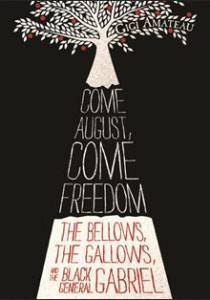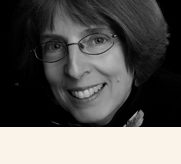How and where is it best  to enter into a particular story—which moment, which sounds and which smells should a writer introduce in the opening scene? When I first read Come August, Come Freedom: The Bellows, The Gallows, and the Black General Gabriel by Gigi Amateau, I was fascinated by Gigi’s decision to begin the story the way she did. I asked her why she chose that approach, and am privileged to feature her answers here. I found Gigi’s comments as engaging as the novel.
to enter into a particular story—which moment, which sounds and which smells should a writer introduce in the opening scene? When I first read Come August, Come Freedom: The Bellows, The Gallows, and the Black General Gabriel by Gigi Amateau, I was fascinated by Gigi’s decision to begin the story the way she did. I asked her why she chose that approach, and am privileged to feature her answers here. I found Gigi’s comments as engaging as the novel.
A. B. Westrick: Come August, Come Freedom is the story of Gabriel, the enslaved blacksmith who organized a massive but ultimately unsuccessful rebellion in Richmond, Virginia, in 1800. What I found intriguing was the way you chose to enter into Gabriel’s story. The first line is, “Ma believed,” and the chapter unfolds to show Ma nursing him when he was six months old. Why did you choose to begin the book with Ma?
Gigi Amateau: As I read and studied about the institution of slavery during Gabriel’s lifetime, I learned (in a way that I hadn’t really integrated into my thinking about slavery before writing Come August, Come Freedom) that the crucible of slavery was the childbearing role of enslaved women. The laws governing a person’s status as free or enslaved were grounded in the concept of maternal descent—the mother’s status (not the father’s) determined a child’s status. So, the impulsion of the plot is maternal descent. Also, I wanted to create the character of Gabriel as a person who was not the first freedom fighter in his community or in his family, but one who was born into a tradition of resisting oppression and fighting for freedom. So, I surrounded him early on in the novel with men and women imagining freedom and rebelling against slavery.
ABW: The opening chapter establishes a strong sense of place—a footpath, the creek beyond the fields, an apple seedling. While it grounds Gabriel and his story, literally and figuratively, it also sets a tranquil tone for a story that’s anything but tranquil. Again, can you talk about choosing to begin the story in this place rather than in, say, a blacksmith’s shop or marketplace, or some other place that Gabriel would have frequented? You might even have chosen to begin it with the scenes that became chapter two—glimpses of slaves treated harshly and slaves dashing for freedom—but instead you chose this tranquil tone. Can you say more about that?
GA: First of all, thank you. Writing a convincing sense of place both in the countryside and in the city was important to me, as was conveying a feeling of tranquility and beauty at the beginning, in the middle, and at the end. To me, it’s valid that Gabriel would have experienced beauty as well as terror. That’s the human experience, right? Even in the darkest days of our history, the human spirit fights for beauty, for love. It would’ve been wrong for me to write this book by dismissing the real suffering and unbearable oppression that was an everyday part of enslavement. All of history shows us how the human spirit insists on faith, hope, and love, so I think it would have been wrong of me to lead with anything but such a spirit.

As I studied the primary source documents related to Gabriel’s Rebellion, I saw that much of the recruiting and planning took place outdoors—on the river, at Young’s Spring, under the bridge at Littlepage. For sure, the blacksmith forge, taverns, and the cityscape were key, too, but the people gathered outside for worship, funerals, weddings, fish feasts, and barbeques. You know, I feel like the evidence suggests that the natural world offered Gabriel some refuge, a place where he and his men could speak candidly. Trial testimony shows that the men did discuss the rebellion at taverns and on the street, and in these places they often spoke in code: The boys on the brook are ready to do the business. When they gathered outside, their words were direct: We have a plan to rise and fight for our freedom.
ABW: Writers are encouraged to begin a novel “in scene” rather than in back-story. You manage to do both: your opening chapter is very much a scene, and at the same time, it depicts Gabriel’s life before he set out to organize the rebellion. I think your approach works because of the sense of yearning, of desire, of feeling that emanates from the opening pages. In early drafts of the novel, was this your opening scene, or did you craft it later?
GA: Hmmm…I always liked that beginning! When I look back at the earliest draft, the first line is: Ma believed. You know, I just feel like this is a story about a man who was part of a multi-generational rebellion, a freedom-movement that started well before him and continued, or continues, long after 1800. So, to me, the story had to start with a linking of generations and end there, too.
ABW: How long did it take you to write Come August, Come Freedom, and can you tell me a little about your process in writing it?
GA: Well, my first research notes are dated 2004. I thought a lot about Gabriel, saved clippings, and dabbled in the research before really starting to write the pages in 2008. My editor, Karen Lotz, and I went on a candlelight tour of Mount Vernon one Christmas… maybe in 2006 or 2007? There, we shared a profound moment while we were standing in the area where the quarter had been at Mount Vernon. The only way to describe it is that we experienced a lingering, a really deep encounter—for me and, I think also for Karen—with the history of our nation’s enslavement of men, women, and children. That’s about when I moved more into researching seriously. The research informed my writing constantly. I never stopped researching! I wrote, then researched more, then wrote more, then researched. It was a very circular and layered process. I’m still researching the story. Who knows, I might stick around the 1800s for a while yet.
ABW: Thank you so much for sharing some of your thoughts and process in writing Come August, Come Freedom. I even enjoyed reading the comment Candlewick Press printed on the book jacket: “Gabriel’s story illustrates how one individual’s pursuit of life, liberty, and happiness can intersect with a nation’s pursuit of a more perfect union. Gabriel went all in for freedom. To me, he is one of American’s greatest patriots.” Thank you, Gigi, for bringing his story to life!

AB, thank you so much for having me on your blog! You asked really great questions. And, I can’t wait to read Brotherhood!
Gigi — The answers you gave me continue to resonate… You’ve taken me to a more spiritual place in the writing of my current work-in-progress. Thank you!